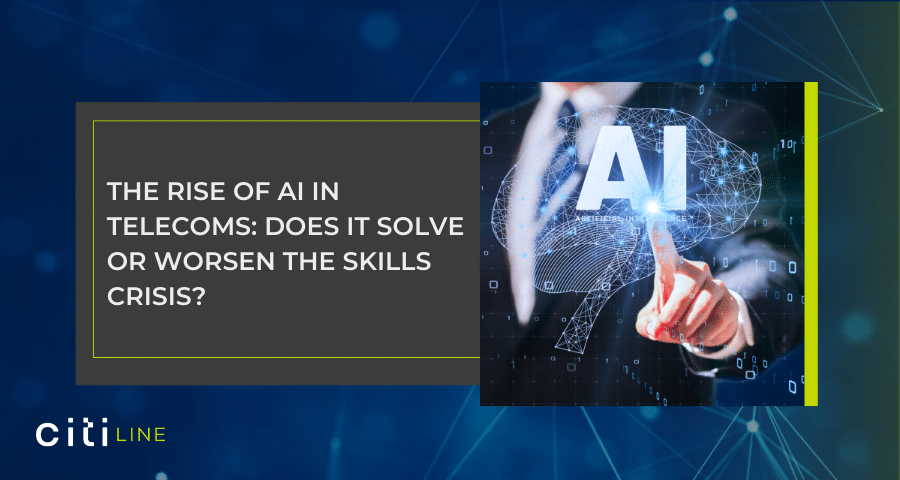The telecoms industry is evolving rapidly, with artificial intelligence (AI) and automation driving unprecedented transformation. From network optimisation to predictive maintenance, AI-powered technologies are revolutionising the way telecoms infrastructure is designed, built, and maintained. However, as automation takes over repetitive and data-driven tasks, a critical question emerges: does AI alleviate the skills crisis in telecoms, or does it exacerbate existing workforce challenges?
AI’s Role in Telecoms: A Game-Changer for Efficiency
AI and automation are reshaping telecoms operations in several key ways:
- Predictive Maintenance: AI-driven analytics can anticipate equipment failures before they occur, reducing downtime and improving service reliability.
- Network Optimisation: Automation enhances network performance by analysing traffic patterns and adjusting configurations in real time.
- Customer Service & Chatbots: AI-powered chatbots handle routine customer inquiries, freeing up human agents for more complex issues.
- Fraud Detection & Cybersecurity: Machine learning algorithms detect unusual activity and prevent security breaches, safeguarding telecom networks.
These advancements increase efficiency, reduce costs, and enhance service quality. However, they also raise concerns about the future of telecoms jobs and workforce adaptability.
The Skills Crisis: Addressing the Talent Shortage
The telecoms industry is facing a significant skills shortage, with experienced professionals retiring and fewer specialists entering the workforce. Key challenges include:
- Aging Workforce: Many skilled telecoms engineers are approaching retirement, leaving a knowledge gap.
- Digital Skills Gap: AI and automation demand new skills, such as data science, machine learning, and software-defined networking.
- Slow Talent Pipeline: Training and upskilling initiatives struggle to keep pace with rapid technological changes.
While AI can automate certain tasks, it cannot replace the need for highly skilled professionals to manage, interpret, and enhance these technologies.
AI as a Solution: Upskilling & New Opportunities
Rather than eliminating jobs, AI is shifting the skills landscape. Key areas where telecoms professionals must adapt include:
- AI & Machine Learning Expertise: Understanding and leveraging AI tools for network management.
- Cybersecurity & Data Protection: As telecoms networks become more complex, security specialists are in high demand.
- Automation Management: Engineers and technicians must learn to oversee and refine automated systems.
Companies investing in upskilling and workforce development will have a competitive edge, ensuring that AI supports rather than replaces human expertise.
The Risks: Can AI Deepen the Skills Shortage?
Without a structured approach to AI adoption, the telecoms sector could face unintended consequences, including:
- Over-Reliance on Automation: A lack of human oversight can lead to system vulnerabilities and operational failures.
- Job Displacement Fears: Without proper reskilling initiatives, experienced workers may struggle to transition to AI-driven roles.
- Talent Attraction Challenges: If telecoms is perceived as an industry where automation replaces jobs, fewer professionals may enter the field.
Striking the Right Balance: AI & Human Expertise Together
AI and automation should be seen as tools to enhance rather than replace human capability. To successfully navigate this shift, telecoms businesses must:
- Invest in Reskilling & Training – Equip employees with AI-related skills and encourage lifelong learning.
- Adopt a Hybrid Workforce Model – Combine AI-driven efficiencies with human problem-solving and oversight.
- Engage Specialist Recruiters – Partnering with telecoms-focused recruitment consultancies like CITILINE ensures access to professionals who can bridge the AI skills gap.
Conclusion: AI as a Catalyst, Not a Replacement
AI and automation have the potential to alleviate the telecoms skills crisis—but only if proper workforce strategies are in place. While automation can streamline processes and improve efficiency, human expertise remains irreplaceable in managing, adapting, and innovating within AI-driven telecom networks.
For telecoms businesses, the key to success lies in balancing technological innovation with talent development, ensuring that AI works alongside skilled professionals rather than replacing them.
As the industry evolves, organisations that embrace this collaborative approach will lead the way in the future of telecoms.
